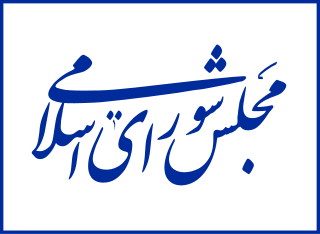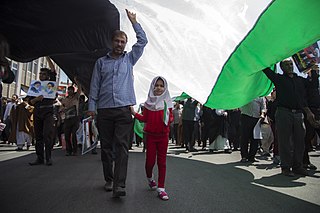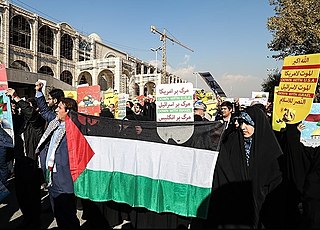Mohammad Doroudian is an Iranian writer, historian, researcher and theorist. Doroudian was born on 1959 in Tehran, and actively writes about the history of the Iran-Iraq War. He holds a BA in History from Shahid Beheshti University. More than seventeen books have been published by Mohammad Doroudian so far. He is one of the elect of the 31st Iran's Book of the Year Awards and the winner of the 8th Holy Defense Year Book Award.
Alireza Feyz was an Iranian author, researcher of Islamic jurisprudence and Islamic philosophy, professor at the University of Tehran and jurist.

The Iranian Law and Legal Research Institute, formerly Allameh Legal Encyclopedia Research Center, is a scientific and juridical research institute, composed of four groups: encyclopedia writing, legal theorization and intellectualism, studies on social impact of laws, and studies on "extra" laws. Operating under the license of the Ministry of Science, Research and Technology of Iran, this research institute is one of the first legal entities to be recognized as a knowledge-based company by the Vice-Presidency for Science and Technology of Iran.

The Specialized Commissions of the Parliament of Iran are groups of representatives that are formed with the aim of expertly reviewing the plans and bills proposed in the Islamic Consultative Assembly of Iran.
The history of the parliament in Iran refers to the history of this legislative body in Iran, which has gone through various stages. This legislative body has been changing and expanding from a 25-member House of Expediency to the present day, which operates under the name of the Islamic Consultative Assembly with 290 members.

In the total 11 terms of the Parliament of the Islamic Republic of Iran, 78 women have won 111 seats in various terms. Some of these women were subsequently disqualified by the Guardian Council, some failed to win the necessary votes to re-enter parliament, some were imprisoned or left Iran, and others are still seeking re-election to the parliament. There are 16 women from 13 constituencies in the current term of the parliament of Iran.

Pursuant to Article 41 of the Law on Internal Regulations of the Islamic Consultative Assembly, the Integration Commission of the Islamic Consultative Assembly, in order to regulate the principles and provisions of development programs and budget bills of the whole country and to establish coordination between the specialized commissions of the Islamic Consultative Assembly, after the relevant bill is submitted by the government to the Assembly, is formed consisting of the following members:
- Nine people from the Program, Budget and Accounting Commission
- Three people from other specialized commission

Pursuant to Article 51 of the Law on Internal Regulations of the Islamic Consultative Assembly, the Program, Budget and Accounting Commission of the Islamic Consultative Assembly shall be formed to perform the assigned tasks within the scope of the country program, country budget, supervision of the program and budget and the Court of Accounts and Finance of the Assembly, and to provide statistics and general technical services in accordance with the provisions of the regulation.

Pursuant to Article 43 of the Law on Internal Regulations of the Islamic Consultative Assembly, the Internal Regulation Commission of the Islamic Consultative Assembly is responsible for reviewing plans and bills proposed by the representatives and branches to amendment of internal regulations and change in the process of implementation of affairs of the Assembly. The commission evaluates the relevant plans and bills and reports the result. Each of the fifteen branches of the Islamic Consultative Assembly is obliged to nominate one of its qualified members to be a member of this commission so that the result can be determined after reviewing his / her credentials. Therefore, the Internal Regulation Commission of the Islamic Consultative Assembly will have 15 members.

Pursuant to Article 44 of the Law on Internal Regulations of the Islamic Consultative Assembly, the Article 90 of the Constitution Commission of the Islamic Consultative Assembly is formed in order to organize and streamline the Assembly and the representatives, especially in relation to the work of the Executive, Judiciary and Parliament branches, based on various articles of the constitution, especially its ninetieth article. The structure of the members of this commission is as follows:
- One representative from each specialized commission of the Assembly
- Eight representatives elected by the heads of branches and the board of directors of the Assembly as permanent members

Pursuant to Article 46 of the Law on Internal Regulations of the Islamic Consultative Assembly, the Education, Research and Technology Commission of the Islamic Consultative Assembly shall be formed in accordance with the provisions of the regulations to perform its assigned duties in the areas of general education, technical and vocational education, higher education and research and technology matters in the Islamic Republic of Iran.

Pursuant to Article 47 of the Law on Internal Regulations of the Islamic Consultative Assembly, the Social Commission of the Islamic Consultative Assembly is formed to perform the assigned duties in the scope of administrative and employment affairs, labor, occupation, labor relations and cooperation in accordance with the provisions of the regulation.

Pursuant to Article 53 of the Law on Internal Regulations of the Islamic Consultative Assembly, the Internal Affairs of the Country and Councils Commission of the Islamic Consultative Assembly is formed to perform its assigned duties within the scope of domestic policy, councils, non-civil affairs of municipalities and civil registration in accordance with the provisions of the regulation.

Pursuant to Article 55 of the Law on Internal Regulations of the Islamic Consultative Assembly, the Civil Commission of the Islamic Consultative Assembly is formed to perform its assigned duties in the fields of road maintenance and transportation, housing, urban and rural development, and civil affairs of municipalities in accordance with the provisions of the regulation.

Pursuant to Article 56 of the Law on Internal Regulations of the Islamic Consultative Assembly, the Cultural Commission of the Islamic Consultative Assembly is formed to perform its assigned duties in the fields of culture and art, guidance and propaganda, radio and television and mass communication, physical education and youth, women and family in accordance with the provisions of the regulation.

Pursuant to Article 57 of the Law on Internal Regulations of the Islamic Consultative Assembly, the Judiciary and Legal Commission of the Islamic Consultative Assembly is formed to perform its assigned duties within the judicial and legal framework in accordance with the provisions of the regulation.

Pursuant to Article 58 of the Law on Internal Regulations of the Islamic Consultative Assembly, the Agriculture, Water, Natural Resources and Environment Commission of the Islamic Consultative Assembly is formed to perform its assigned duties in the fields of agriculture, water resources, livestock and poultry, fisheries, the environment and meteorology in accordance with the provisions of the regulation.

The Act to confronting the hostile actions of the Zionist regime against peace and security is a plan that was passed on May 20, 2020 by the Islamic Consultative Assembly in accordance to the Article 123 of the Constitution of the Islamic Republic of Iran. The Act is a comprehensive plan including 16 articles to counter the hostile actions of the Zionist regime against the people of Palestine, Islamic countries and the Islamic Republic of Iran. The Act refers to the destructive role of the illegitimate regime of Zionist in disrupting regional and international peace and security and widespread and systematic violation of the human rights.

The Protection of the Islamic Revolution of the Palestinian People Act is a plan that was passed on May 9, 1990 by the Islamic Consultative Assembly. The Act refers to the illegal occupation of Palestinian territories by the Zionist regime and the need to support the Palestinian people in restoring their legal rights.

The Act to Obliging the Government to Provide Comprehensive Support to the Oppressed Palestinian People is a plan that was passed on December 31, 2008 by the Islamic Consultative Assembly in accordance to the Article 123 of the Constitution of the Islamic Republic of Iran. The Act refers to the humanitarian aid of the Iranian nation to the oppressed nation of Palestine and condemnation of the crimes of the Zionist regime against them.








